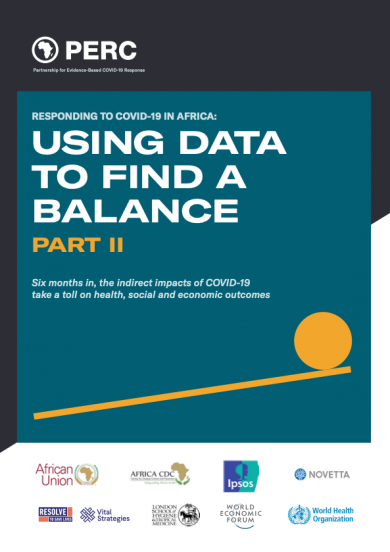
Responding to COVID-19 in Africa: Using data to find a balance - Part II
Six months into the COVID-19 pandemic, governments have had to make tough decisions about how best to protect the public’s health first and foremost, while also safeguarding livelihoods and reducing the social harm that can come with bringing many society activities to a near halt. Generally, African Union (AU) Member States have confirmed fewer cases per capita compared to other regions of the world. Reported cases peaked in late July and early August—driven by the epidemic in South Africa—and have since tapered off; however, data on testing capacity indicates many cases are going undetected. This report—which is the second in the Partnership for Evidence-Based Response to COVID-19’s (PERC) “Responding to COVID-19 in Africa: Using Data to Find a Balance”—analyzes multiple data sources to help governments as they navigate the pandemic, which does not yet have an end date in sight.
A PERC survey (conducted in 18 AU Member States between 4 and 17 August 2020) found high support for PHSMs. Most respondents also reported adherence to wearing a mask, washing hands, and watching their distance from others, reported adherence to measures that restrict economic activity and limit public gatherings were much lower. This is expected, as many governments have loosened these measures since June. However, the survey uncovered tension between respondents’ desire to reopen the economy and anxiety about how doing so could affect their health.
Close to half of respondents in need of care missed or delayed health services, and a similar percentage reported difficulty accessing medication. Nearly a quarter attributed missed services to worry of catching COVID-19, either
in travel to their destination, or directly from the health facility. Seven in 10 respondents reported that their household income in the previous week was smaller compared to the same time last year, and the same proportion reported problems accessing food in the previous week.


